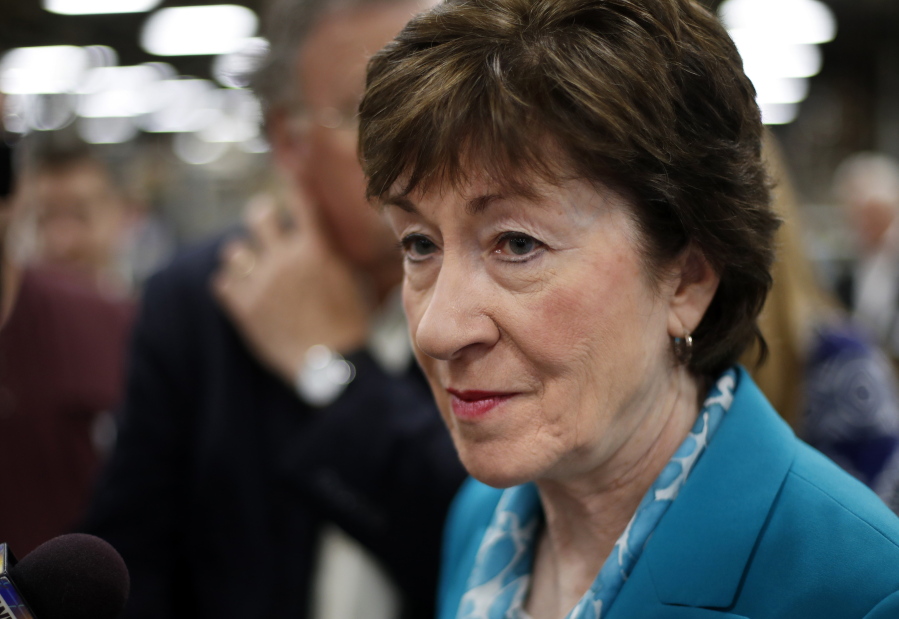WASHINGTON — Obamacare lives on.
Senate Republicans, short of votes, abandoned their latest and possibly final attempt to kill the health care law Tuesday, just ahead of a critical end-of-the-week deadline.
The repeal-and-replace bill’s authors promised to try again at a later date, while President Donald Trump railed against “certain so-called Republicans” who opposed the GOP effort. But for now, Trump and fellow Republicans who vowed for seven years to abolish President Barack Obama’s law will leave it standing and turn their attention to overhauling the nation’s tax code instead.
The GOP’s predicament was summed up bluntly by Sen. Bill Cassidy of Louisiana, a lead author of the legislation: “Through events that are under our control and not under our control, we don’t have the votes.”
“Am I disappointed? Absolutely,” he said after a GOP lunch attended by Vice President Mike Pence.
Standing alongside Cassidy, Majority Leader Mitch McConnell said: “We haven’t given up on changing the American health care system. We are not going to be able to do that this week, but it still lies ahead of us.”
“We do think it’s time to turn to our twin priority, reforming the tax code,” McConnell said.
There was much talk of returning to the repeal effort later, but not all Republican senators were putting on that brave face.
Sen. John Kennedy of Louisiana described the bill as “dead as a doornail.”
The bill Cassidy co-authored with Sen. Lindsey Graham of South Carolina would have unraveled the central elements of Obama’s law, including the requirement for Americans to carry health insurance or pay fines, and offered block grants to states to design their own systems with less federal control.
Republicans are also strongly in agreement on a need for action on overhauling the loophole-ridden U.S. tax code, and hope that if they also succeed in getting Americans a tax cut, their failure on health care will be forgiven.
Yet they began the health care effort with unanimity, too, up until the devilish details began to emerge and divide them as they pursued a partisan effort against united Democratic opposition.
Much the same could happen on taxes, where Republicans are at the beginning of the process, with plans to unveil a blueprint on Wednesday.
On health care, the urgency confronting the GOP this week lay in special budget rules that protected the legislation from a Democratic filibuster, allowing the Republicans to pass it with just 50 votes, plus a tie-breaker from Pence, instead of the 60 often required. Those special rules expire Sept. 30.
Even with that advantage McConnell had little room for error given his slim 52-48 vote majority in the 100-member Senate. And as in July, when Arizona Sen. John McCain cast a dramatic late-night thumbs down to kill the previous repeal bill, McConnell was unable to corral the 50 “Ayes.”
In addition to McCain, moderate GOP Sen. Susan Collins of Maine announced her opposition, as did conservative Sen. Rand Paul of Kentucky. Several other senators were skeptical or undeclared, among them Lisa Murkowski of Alaska, who waited until McConnell had conceded defeat Tuesday to issue a statement criticizing “a lousy process” on the legislation.
A full analysis of the legislation was never completed by the nonpartisan Congressional Budget Office, contributing to critics’ complaints of a rushed process, but independent experts warned that millions could lose coverage, states could relax existing requirements, and coverage could end up being unaffordable for many, including people with pre-existing conditions.
The legislation also would have cut $1 trillion from Medicaid over the next decade, prompting angry protesters in wheelchairs to descend on the one hearing held on the bill, on Monday, chanting “No cuts to Medicaid! Save our liberty!” Dozens were pulled out and arrested as cameras captured the striking scene.



